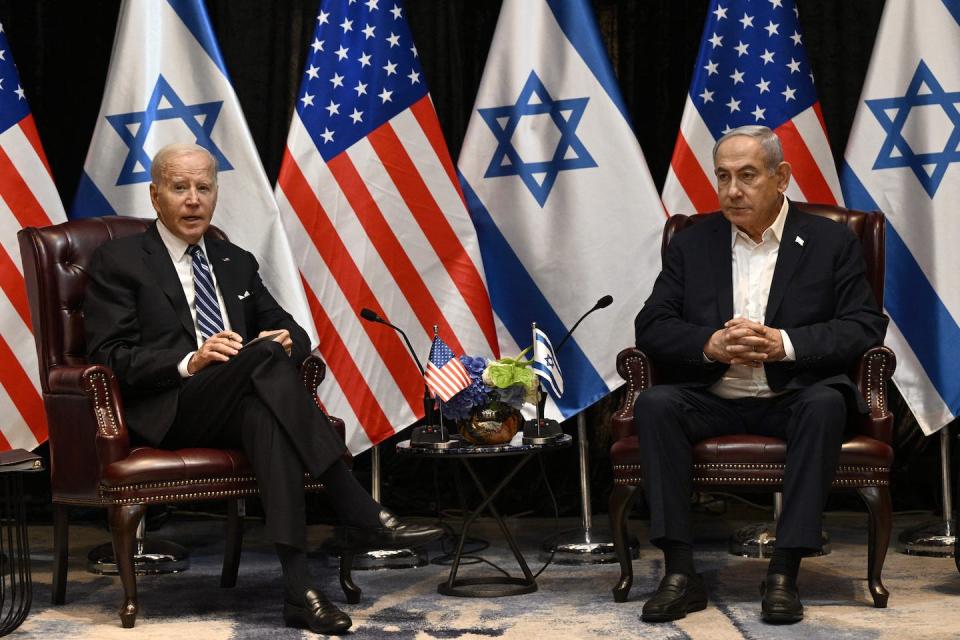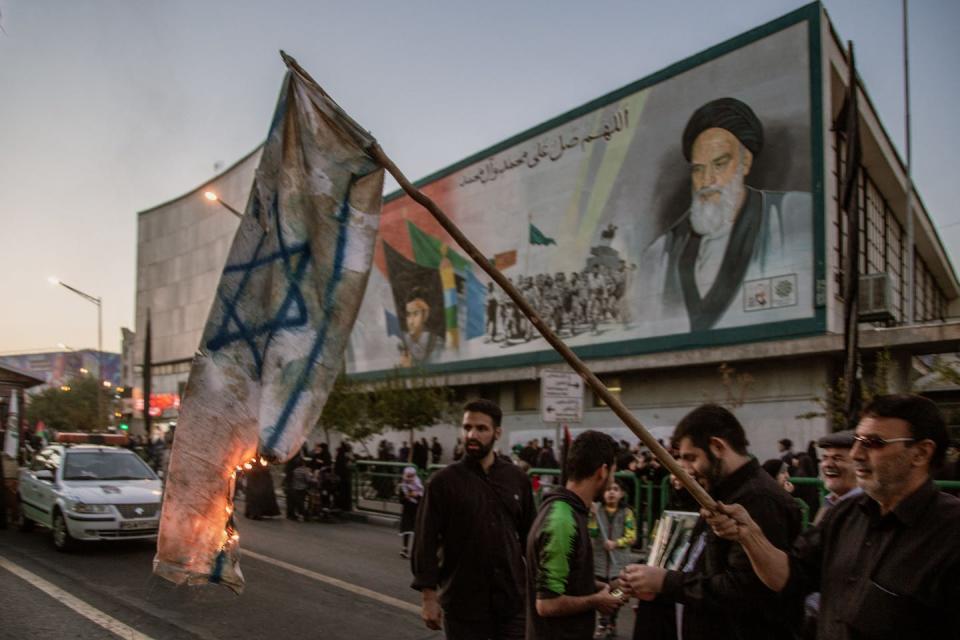As Israel readies for a ground invasion of Gaza, and Palestinian and Israeli civilian deaths continue to mount, a broader struggle for influence continues in the Middle East between the United States and Iran.
The U.S. has long played an important leadership role in the Middle East. American influence has hinged on maintaining close ties to diverse allies, including Israel, Egypt, Jordan, Turkey, Saudi Arabia and the United Arab Emirates.
And since the 1979 Iranian Revolution, Iran’s leaders have sought to boost their regional influence and secure their domestic position in power by undermining America’s relationships in the Middle East.
Iran has built its own regional network, composed largely of Shia Muslim entities, including Bashar al-Assad’s regime in Syria and the Lebanese militant group Hezbollah.
Iran also has long supported Hamas, a Sunni Islamist movement and U.S.-designated terrorist group that controls Gaza. Like Iran, Hamas is committed to the destruction of Israel.
As a scholar of international politics, I am interested in how this rivalry between the U.S. and Iran has evolved and how this war may affect it.
The long-standing Israel-Palestinian dispute is central to Iran’s regional strategy, which aims to drive a wedge between Israel and its neighbors and complicate U.S. relations throughout the Arab world. So far, the Israel-Hamas war appears to be having precisely those effects.
Iran’s role in the Gaza war
Iran has denied direct involvement in Hamas’ Oct. 7, 2023, atrocities in Israel, in which Hamas fighters killed about 1,400 people and kidnapped more than 200.
U.S. officials and others have said that it is too soon to determine Iran’s exact role in the violence.
Iranian Supreme Leader Ayatollah Ali Khamenei has applauded the attacks.
He has called Israel’s ensuing assault on Gaza “a genocide,” as Palestinian casualties generate large protests against the Israeli offensive throughout the Middle East.
Israeli strikes on Gaza since Oct. 7 have killed more than 3,780 people, according to the United Nations.
Iran has also threatened “preemptive” action against Israel if it continues its offensive.
Israel and Hezbollah are now exchanging daily artillery and rocket fire. Israel has drawn a buffer zone near its border with Lebanon and has begun evacuating its citizens there.
Israel also has bombed key airports in Syria, its longtime adversary, which also has strong ties to Hezbollah.
These actions bring Israel, one of America’s closest allies, perilously closer to a wider war with a coalition backed by Iran.
Iran’s push for regional clout
Over the past several decades, Iran has looked to grow its regional influence while exploiting the differences between the U.S. and Israel.
In Lebanon, Iran helped build Hezbollah in the early 1980s, backing deadly 1983 attacks on the U.S. Embassy and Marine barracks in Beirut.
In Iraq, Tehran has built influence by affiliating itself with friendly Shiite groups following the 2003 overthrow of Saddam Hussein, who was one of Iran’s top rivals.
In Syria, Iran and Hezbollah have helped the Assad regime gain an upper hand in the country’s ongoing civil war by giving the government weapons, intelligence and troops.
And in Yemen, Iran has backed Shiite rebel groups that are fighting the government, which is in turn supported by Saudi Arabia and the United Arab Emirates.
Iran’s support for Palestinian militants
In the Palestinian territories, meanwhile, Iran has supported militant groups since the 1980s. By the early 1990s, Iranian forces and Hezbollah were training Hamas fighters in Lebanon.
Iran boosted aid to Hamas during the Second Intifada, a violent Palestinian uprising from 2000 to 2005, and again after a 2006 election victory brought Hamas to power in Gaza. Iran also gave weapons and money to Hamas during its 2008-09 and 2014 armed conflicts with Israel.
Recurrent fighting in Gaza has helped keep the Israeli-Palestinian conflict salient in Middle Eastern politics. This fighting and tension has advanced Iran’s aims of undermining U.S. and Israeli ties with Iran’s Arab rivals, such as Egypt, Jordan and Saudi Arabia.
The United States therefore scored a major diplomatic victory by brokering the 2020 Abraham Accords, in which Bahrain and the United Arab Emirates agreed to have diplomatic relations with Israel.
Not to be outdone, Iran announced it made a deal to restore diplomatic relations with Saudi Arabia in March 2023, seven years after they broke ties.
After this announcement, U.S. officials tried to make a deal to formalize relations between Israel and Saudi Arabia – an agreement that the Gaza war has put on ice. Some analysts have speculated that Iran may have encouraged Hamas to attack Israel precisely for this reason.

The diplomatic challenge ahead
The Israel-Hamas war poses serious diplomatic challenges for the U.S.
Israel’s bombing, threatened ground invasion and restrictions of aid to Gaza has energized its enemies and created additional tensions with its partners.
Turkish President Recep Tayyip Erdogan has called the Israeli assault a “massacre.” Qatar has blamed Israel for the violence, while Egyptian President Abdel Fattah el-Sisi has said Israel’s campaign amounts to “collective punishment” of the people of Gaza.
Preventing a wider war
Fraying diplomatic ties among some partners became even more apparent after Hamas accused Israel of the Oct. 17 explosion outside a Gaza hospital. Although Israel and the U.S. have maintained that Palestinians caused the explosion,, possibly in error, anti-Israel demonstrations quickly swept across the Middle East.
Shortly before President Joe Biden arrived in Israel for a regional visit on Oct. 18, Jordan canceled his planned summit with el-Sisi, Jordanian King Abdullah II, and Palestinian Authority leader Mahmoud Abbas.
The Biden administration has tried to balance strong support for Israel with a message of restraint.
During his visit to Israel, Biden defended Israel’s right to respond to protect its borders and people and tried to deter Iran and others from expanding the war. At the same time, he pressed Israel to follow the laws of war, and he secured an Israeli agreement to allow some aid into Gaza through Egypt. The Egypt-Gaza border crossing opened to allowed some bottled war and medical supplies in to Gaza on Oct. 21.
Despite tension and anger across the region, the Biden administration’s effort to deter Iran and prevent a wider war aligns with the priorities of most Arab governments, which fear Tehran and its allies are deeply wary about domestic and regional stability.
Perceptions that Tehran is causing escalation and regional instability could push other nations back toward Washington. Pressing for Israeli restraint may be the key both to mitigating the humanitarian crisis and to preventing Iran from emerging a winner from the war in Gaza.
This article is republished from The Conversation, an independent nonprofit news site dedicated to sharing ideas from academic experts. If you found it interesting, you could subscribe to our weekly newsletter.
It was written by: John Ciorciari, University of Michigan.
Read more:
John Ciorciari does not work for, consult, own shares in or receive funding from any company or organization that would benefit from this article, and has disclosed no relevant affiliations beyond their academic appointment.


